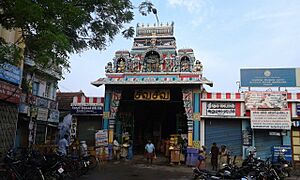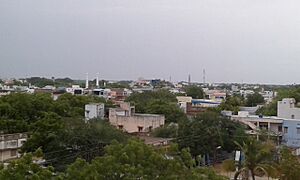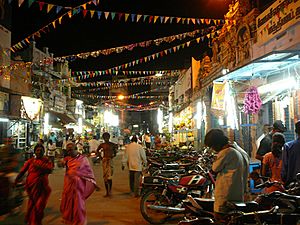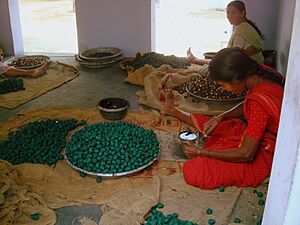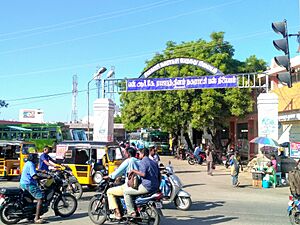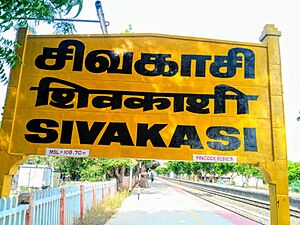Sivakasi facts for kids
Quick facts for kids
Sivakasi
Little Japan of India
|
|
|---|---|
|
Municipal corporation
|
|
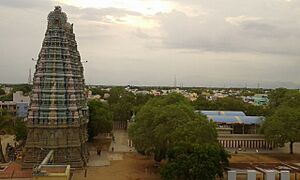
Image of town around the tower of Badrakali Amman Temple
|
|
| Nickname(s):
Little Japan of India, Cracker City of India
|
|
| Country | |
| State | |
| District | Virudhunagar |
| Revenue Division | Sivakasi |
| Taluk | Sivakasi |
| Founded by | Harikesari Parakkirama Pandian |
| Named for | The deity Shiva and the city Kashi (Varanasi) |
| Government | |
| • Type | Municipal Corporation |
| • Body | Sivakasi Corporation |
| Area | |
| • Total | 46.27 km2 (17.86 sq mi) |
| Elevation | 127 m (417 ft) |
| Population
(2021)
|
|
| • Total | 160,047 |
| • Density | 3,459.0/km2 (8,958.7/sq mi) |
| Demonym(s) | Sivakasian Sivakasikaran |
| Languages | |
| • Official | Tamil |
| Time zone | UTC+5:30 (IST) |
| PIN |
626123, 626124, 626189, 626130
|
| Telephone code | 04562 |
| Vehicle registration | TN 67, TN 84, TN 95 |
Sivakasi is a busy city in the Virudhunagar District of Tamil Nadu, India. It's often called the "Cracker City of India" or "Little Japan of India." This is because it makes about 70% of India's firecrackers and matches. Sivakasi also produces 30% of all diaries made in India.
Many people work in these industries. The city's businesses bring in a lot of money each year. Sivakasi was founded in the 15th century by King Harikesari Parakkirama Pandian. Over time, different rulers controlled the city. These included the Pandyas, the Vijayanagar Empire, and the British Raj.
Sivakasi has a dry climate. This weather is good for growing crops like cotton and chillies. The Badrakali Amman temple is a very important landmark. Its festivals are big events in the city. Sivakasi has good road and rail connections. As of 2021, about 160,047 people live there.
Contents
A Look at Sivakasi's Past
Sivakasi started in the early 1400s. A king named Harikesari Parakkirama Pandian ruled this area. He was a Pandya king. A Hindu story says he wanted to build a temple for the god Shiva. He went to Kasi to get a special stone called a lingam.
On his way back, he rested under a tree. The cow carrying the lingam stopped and wouldn't move. The king realized Shiva wanted the lingam placed right there. So, the place where the "Shiva lingam from Kasi" was set up became known as Sivakasi.
Later, Sivakasi became part of the Madurai region. It was ruled by different groups. These included the Nayaks and the British East India Company. In 1801, the British took full control.
In 1899, there were some big events called the Sivakasi riots. They caused a lot of trouble. The British military had to step in to stop them.
The local government for Sivakasi started in 1920. After India became independent in 1947, Sivakasi grew. It became a major industrial city. It is now known for its firecracker, match, and printing factories.
Where is Sivakasi?
Sivakasi is located in the Virudhunagar district of Tamil Nadu. It sits about 101 meters (331 feet) above sea level. The city is about 74 kilometers (46 miles) from Madurai.
The land around Sivakasi is mostly flat. There are no big mountains or hills. The soil is black and red. This soil is good for growing cotton, chillies, and grains.
Sivakasi has hot and dry weather all year. Temperatures can go from 23°C (73°F) to 39°C (102°F). April to June are the hottest months. December and January are the coolest.
The city doesn't get much rain. Most of the rain comes in October, November, and December. The city's local government covers an area of about 6.8 square kilometers (2.6 square miles).
People of Sivakasi
In 2011, Sivakasi had a population of 71,040 people. There were slightly more females than males. About 6,963 children were under six years old.
Most people in Sivakasi are Hindus (85.42%). There are also many Muslims (9.21%) and Christians (5%). The average literacy rate was 79.62%. This means most people can read and write.
Many people in Sivakasi work in factories. They make matches, firecrackers, and printed goods. The city's population grew a lot between 1961 and 1971. This was because of the growth of industries.
Schools and City Services
Sivakasi has several schools. In 2011, there were five government schools. There were also ten private schools. The city has colleges for engineering, arts, and science. Mepco Schlenk Engineering College is a well-known one.
The Tamil Nadu Electricity Board provides electricity to Sivakasi. Water for the city comes from the Vaippar river. It is stored in reservoirs and sent to homes.
The city government collects about 45 metric tons of trash every day. They work to keep the city clean. Sivakasi does not have an underground sewer system. Homes use septic tanks.
The city has one government hospital. There are also health centers and many private clinics. In 2011, the city had over 2,500 streetlights. These lights help keep the streets safe at night. The city also runs two markets for residents.
Sivakasi's Economy
Sivakasi's economy relies on three main industries. These are firecrackers, matchbox making, and printing. The city has many registered factories for these products.
Sivakasi is a major center for firecracker making in India. About 70% of India's firecrackers and matches come from here. The hot and dry climate is perfect for these industries.
The city is also a big producer of diaries. It makes 30% of all diaries in India. The printing industry started by making labels for firecrackers. Now, it uses modern machines and has grown a lot.
Sometimes, there are safety concerns in the firecracker factories. The government has worked to improve safety. They also made rules to ensure children are not working in these factories.
Getting Around Sivakasi
Sivakasi has a good road network. The city government maintains over 65 kilometers (40 miles) of roads. Four main roads connect Sivakasi to nearby towns.
City buses help people travel within Sivakasi and to nearby areas. Private minibuses also offer local transport. The main bus stand is in the city center.
Long-distance buses connect Sivakasi to major cities like Chennai and Madurai. Since it's an industrial city, many trucks come and go daily. They load and unload goods for the factories. Autos are also a common way to get around.
The Sivakasi railway station connects the city to other parts of India. Trains like the Podhigai Express travel to Chennai Egmore. There's also another station at Thiruthangal.
The closest international airport is Madurai International Airport. It is about 70 kilometers (43 miles) away.
Culture and Traditions
The Arulmigu Viswanatha Swamy Temple is an old and important temple in Sivakasi. King Arikesari Parakkirama Pandian built it between 1428 and 1460.
The Badhrakali Amman temple is another famous temple. Its main tower, called a Rajagopuram, is very tall. Two big annual festivals are "Panguni Pongal" and "Chithirai Pongal." These are celebrated for ten days in April and May.
Sivakasi also has important mosques, like Periya Palli Vasal and Chinna Palli Vasal. The CSI Regland Memorial Church is a well-known church in the city.
Famous People from Sivakasi
- Thondar Duraiswamy (1915–1971), a hero of India's freedom movement.
- Sridevi (1963-2018), a famous Indian actress.
Sports and Fun
The AJ Indoor Stadium on Velayutham Road is a major sports place in Sivakasi. It has coaching for badminton, table tennis, and basketball. Many sports events are held here. These include district, state, and national level badminton championships.
Images for kids
 | Lonnie Johnson |
 | Granville Woods |
 | Lewis Howard Latimer |
 | James West |




